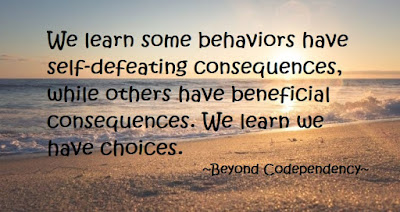We can control how we respond to other people's expectations.
During the course of any day, people may make demands on our time, talents, energy, money, and emotions. We do not have to say yes to every request. We do not have to feel guilty if we say no. And we do not have to allow the barrage of demands to control the course of our life.
We do not have to spend our life reacting to others and to the course they would prefer we took with our life.
We can set boundaries, firm limits on how far we shall go with others. We can trust and listen to ourselves. We can set goals and direction for our life. We can place value on ourselves.














